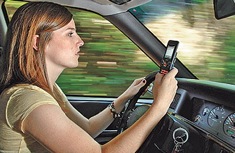 News that text messaging played a role in the deadly L.A. commuter train crash has thrust the practice of texting while driving into the national debate.
News that text messaging played a role in the deadly L.A. commuter train crash has thrust the practice of texting while driving into the national debate.
(Update) The National Safety Board reported Oct. 1 that engineer Robert Sanchez sent a text message 22 seconds before the crash, after he had sent and received text messages numberous times during his shifts that day. He received a text message 80 seconds before the crash, the NTSB said.
Wireless industry analyst Jack Gold said the widely publicized information that Sanchez had been texting certainly will inspire more legislation against the practice.
The cellular industry “can’t win this one,” Gold told Computerworld shortly after the texting suspicions first were reported. “What politician would vote against a bill against texting while driving if they find a train engineer killed 25 people while texting?”
The New York Times tackled the issue in a front-page article. “Though there are no official casualty statistics, there is much anecdotal evidence that the number of fatal accidents stemming from texting while driving, crossing the street or engaging in other activities is on the rise,” the Times reported.
“We have had far too many tragic incidents around the country that are painful proof that this is a terrible problem,” said California state Sen. Joe Simitian, author of the law banning handheld cell phone use by motorists.
Update: California Gov. Arnold Schwarzenegger signed Simitian’s anti-text messaging bill on Sept. 25. The ban on texting will take effect Jan. 1.
“This is a public-safety crisis, not just good sense,” L.A.’s Daily News editorialized when it called for Schwarzenegger to sign the texting bill.
The new law prohibits driving “while using an electronic wireless communications device to write, send, or read a text-based communication.” The law will “impose a base fine of $20 for a first offense and $50 for each subsequent offense.”
Now six states — Alaska, California, Minnesota, New Jersey, Louisiana and Washington — have outlawed driving and texting. At least 15 other states have texting-related bills up for legislative approval, many of them linked to proposed bans on using cell phones without hands-free devices.
Washington was the first state in the nation to pass legislation banning text messaging while driving. The practice is going by the acronym DWT — driving while texting.
A survey by Nationwide Insurance found that 40% of teenage drivers engage in texting while driving. Overall, about 18% of drivers say they send and receive text messages while on the road. The numbers were collected two years ago, so they no doubt have increased with the popularity of the iPhones and similar multitask cell phones.
The California Public Utilities Commission reacted to the Chatsworth, Calif., train crash by placing an emergency ban on all train personnel using cell phones or other wireless devices while on duty.
The NSB said it would “correlate (Sanchez’s wireless use) with other investigative information to determine as precisely as possible the exact times of those messages in relation to the engineer’s operation of his train.”

